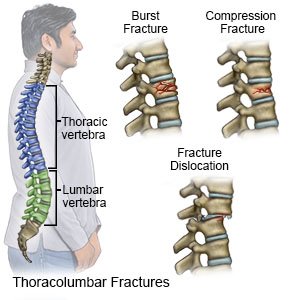Thoracolumbar Fracture
Medically reviewed by Drugs.com. Last updated on Aug 4, 2025.
A thoracolumbar fracture is a break in a thoracic or lumbar vertebrae. The thoracic vertebrae are the 12 bones between your neck and lower back. They are connected to your ribs and help the ribs move when you breathe. The lumbar vertebrae are the 5 bones between your chest and hips. When a vertebra is damaged, the spinal cord may also be damaged.
 |
WHILE YOU ARE HERE:
Informed consent
is a legal document that explains the tests, treatments, or procedures that you may need. Informed consent means you understand what will be done and can make decisions about what you want. You give your permission when you sign the consent form. You can have someone sign this form for you if you are not able to sign it. You have the right to understand your medical care in words you know. Before you sign the consent form, understand the risks and benefits of what will be done. Make sure all your questions are answered.
Medicines
may be given for pain. Do not wait until the pain is severe to ask for more medicine.
Tests:
- An x-ray, CT scan, or MRI will be done to check for broken bones or other problems. You may be given contrast liquid to help the bones show up better in the pictures. Tell the healthcare provider if you have ever had an allergic reaction to contrast liquid. Do not enter the MRI room with anything metal. Metal can cause serious injury. Tell the healthcare provider if you have any metal in or on your body.
- A bone scan is a test done to show areas where your bone is diseased or damaged. You will get a radioactive liquid, called a tracer, through a vein in your arm. The tracer collects in your bones and shows up in pictures.
Treatment:
- Bed rest may be used for a mild fracture. Bed rest helps prevent injury and protects the vertebra until it heals.
- A back brace or back cast may be used for support. Sometimes a corset (binder) may be used to support a weak spine.
- A walker may help decrease the load on a broken spine.
- Physical or occupational therapy may be started in the hospital and continued at home. A physical therapist teaches you exercises to help improve movement and strength, and to decrease pain. An occupational therapist teaches you new ways to do daily activities after an injury.
- Surgery may be needed for a severe fracture. Surgery is used to move the bones to their correct positions.
RISKS:
Limited movement may increase your risk of a blood clot in your leg or arm. This may become life-threatening. Your spine may not heal normally and you may have chronic pain.
CARE AGREEMENT:
You have the right to help plan your care. Learn about your health condition and how it may be treated. Discuss treatment options with your healthcare providers to decide what care you want to receive. You always have the right to refuse treatment.© Copyright Merative 2025 Information is for End User's use only and may not be sold, redistributed or otherwise used for commercial purposes.
The above information is an educational aid only. It is not intended as medical advice for individual conditions or treatments. Talk to your doctor, nurse or pharmacist before following any medical regimen to see if it is safe and effective for you.
Learn more about Thoracolumbar Fracture
Treatment options
Care guides
Symptoms and treatments
Medicine.com guides (external)
Further information
Always consult your healthcare provider to ensure the information displayed on this page applies to your personal circumstances.
